ILLUMINE interviewed some of Chicago’s first yoga studio owners and some longtime teachers. Here is a sampling of the rich stories and reflections from the conversations.
Twenty-some years ago, in Chicago and the surrounding suburbs, a small and mighty group of visionaries courageously set down roots for a movement not only in this corner of the country, but also in the world. The men and women who started the notion of communal practice and opened the first studios in Chicago are, at turns, serious and humorous, devout and irreverent, studious practitioners of a centuries-old discipline and phenomenal free-thinking innovators. They took financial and professional risks, all the while nurturing the hope that providing the experiences of yoga would be somehow become fruitful. They are investors, so to speak, of their own energy, prana and passion, and we, the Chicagoland yoga community and its over 300 studios and thousands of students, benefit from their investment.
On the Chicago yoga community
Chicago is an easy place to be because people are friendly and open and accepting. It was easy to stay here. I like the vibe of the city, my friends, my students…Chicago is a powerful and unique place for yoga and spiritual practices. —Suddha Weixler
There’s something warm, endearing and honest in Chicago. I have a loyal community. When they say they’re going to be here, they’re going to be here. The first thing they say is, “What can I bring?” You feel it, it’s palpable. Teachers who visit from all over say, “People are really kind and generous here.”
—Laura Jane Mellencamp
I’m probably very biased, but Chicago yoga is fantastic. Chicago’s actually a really good city to do yoga in. There is a lot of intelligent instruction, but one of the nice things about Chicago is that it’s a “celebrity-free zone.” I feel like there’s a little bit less pomp and circumstance around a lot of the teachers in Chicago. —Quinn Kearney
The growth of yoga in Chicago makes instructors and studio owners strive to be better. I like to call it healthy competition, where we all want each other to succeed because ultimately we’re just trying to get people to do yoga. —Pam Udell
I’ve heard from other people who have gone to places like LA or New York to teach that you just disappear, get lost in bigger communities. Chicago may be in the middle, boring, stable, but it’s manageable, there’s the Midwest values. —Paula Kout, owner, White Iris Yoga Therapy
On opening a yoga studio
When I began with yoga, it was not in interest of money, to become rich or to open a business. It was basically karma yoga. You do something without expectation. You do your best—you accept whatever comes whether it’s failure or success. Yoga wasn’t a commercial business in the beginning—it just happened. Over the past 30 years, the industry has shifted. Now it’s a big business: yoga mats, yoga whatever—it’s an enterprise. —Suddha Weixler
Good teachers practice consistently and conscientiously and are able to “hold space” for their students—that is, empathize with, listen to and support them. —Amy Treciokas, owner, Yoga Now
I was just really going deeper into my own practice…I went to India to study with Pattabhi Jois, and that even brought it more so. And then coming back, it was like now it’s time to introduce this to people. It was very slow going, and I did it because it was me doing it because I believed in it, not because it was going to make the studio money or anything else. I just did it because I was committed to this as a practice I believed in. —Sharyn Galindo
Everyone has a different constitution, so the practice needs to be individualized to meet the needs and the goals of the student. So we [at Moksha] offer different styles and systems that assist in the process…We also have freestyle, which goes along with the American spirit…I believe that we need to balance between tradition and innovation. —Daren Friesen, founder, Moksha Yoga Center
When I began White Iris Yoga in 1991, I started teaching out of my home to keep overhead costs down. I was acting out my dharma and felt very compelled to do this at the time, it was like flying off a cliff and free falling. The evolution of my studio was lovely, a slow build, organic. Until 2002, when I had to teach less because I had to manage a demanding business, I realized that this is not what I wanted. I’m a yoga teacher first. —Paula Kout
The future of yoga
The large corporate yoga chains are viewed by some as a threat to small independent studios. The threat [is] that yoga is losing its soul, and its spirit and its traditional purpose…but where you look is what you’re going to see. And we also see lots of independent studios and lots of great teachers and lots of great practitioners. —Daren Friesen
I just try to remind myself, whether it’s in a class or the world at large, let people be. Let them be, the culture’s going to do what the culture’s going to do. There remains a wide range of options out there in Chicago—the kind of yoga that might correspond to who you are right now. —Mary Schmich
We’re kind of all going back to not the basics, but going back to slowing down a little bit, knowing that our practice is our own journey and that we don’t need to keep up with the person next to us. So I think that’s the responsibility of owners of studios and instructors to just remind people of that, so that’s where the growth will come, is that they’ll continue to be coming to classes 20 years from now. —Pam Udell
I think yoga will survive all of “this.” The essence of yoga is grounded, and all of the chocolate, wine, naked yoga…whatever, will come and go, but the true essence of yoga will remain. —Paula Kout
Special thanks to Jeff Bunn and Karen Carter for capturing the insights of these yoga visionaries.


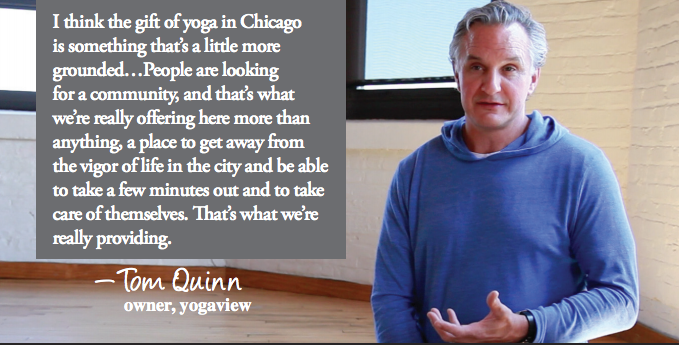
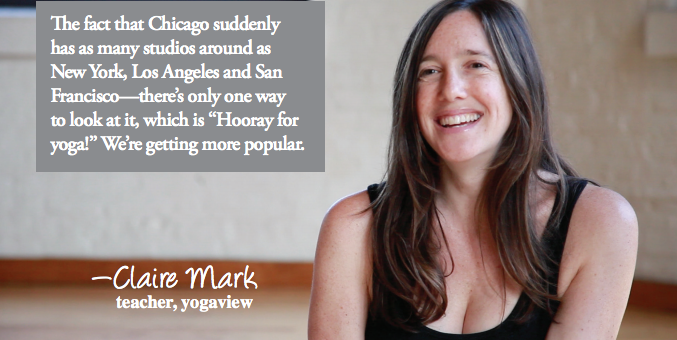
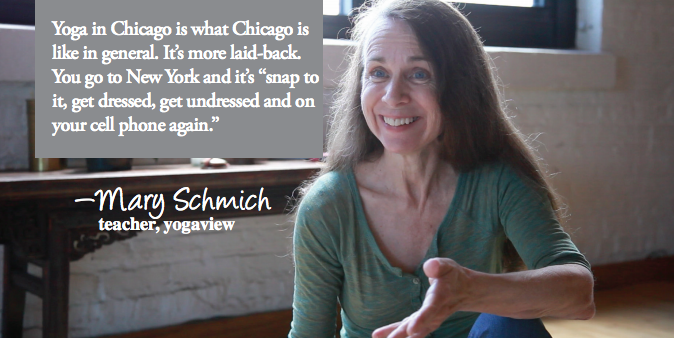
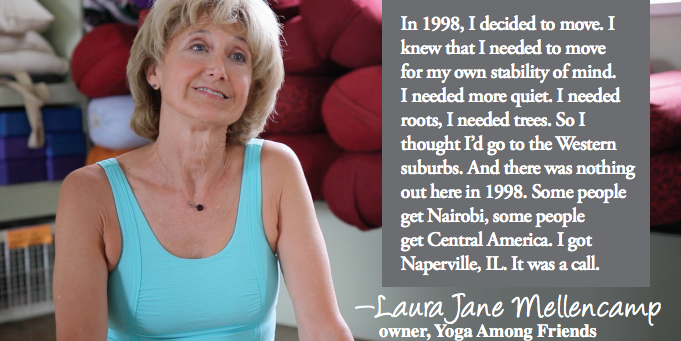
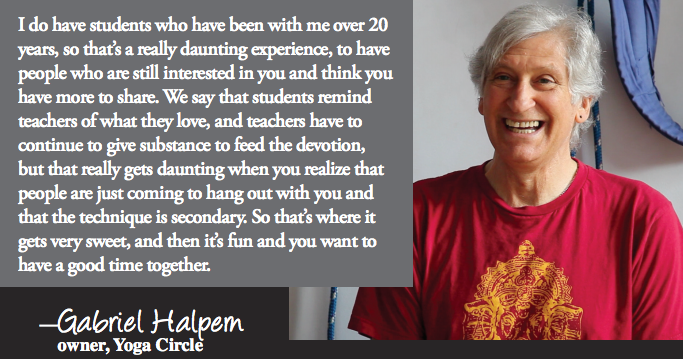
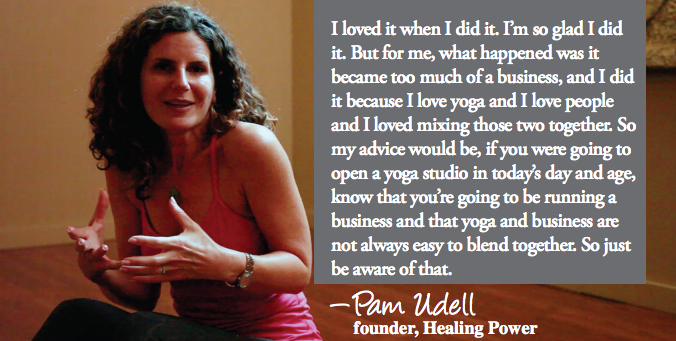
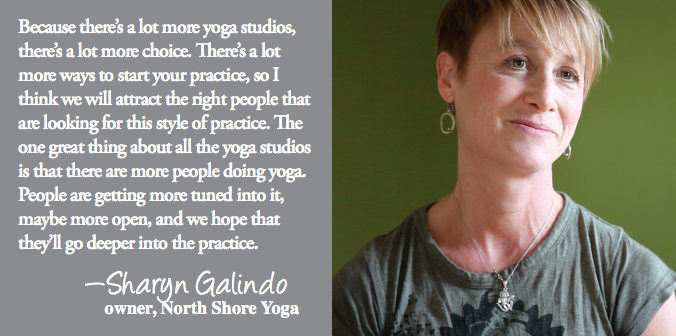
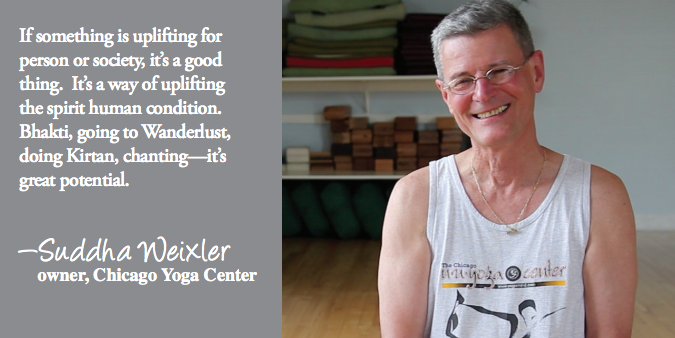
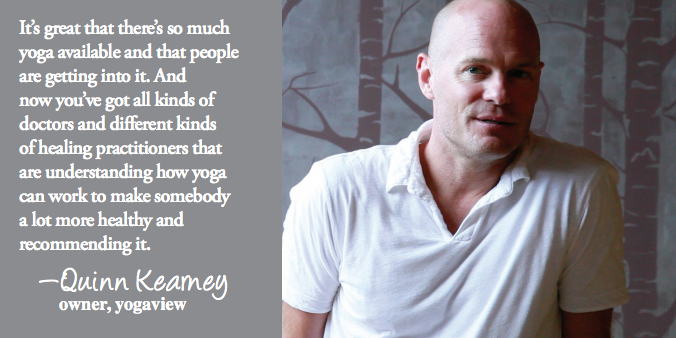
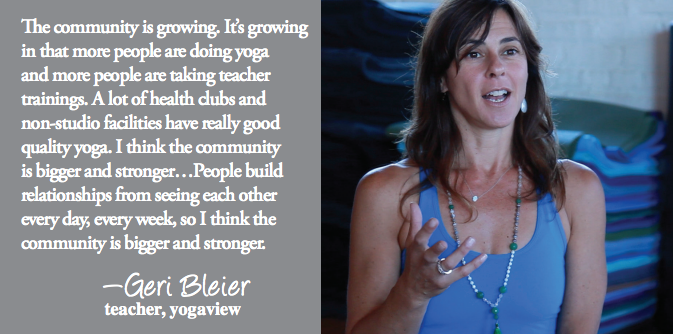






















No Responses to “Chicago’s Yoga Roots”